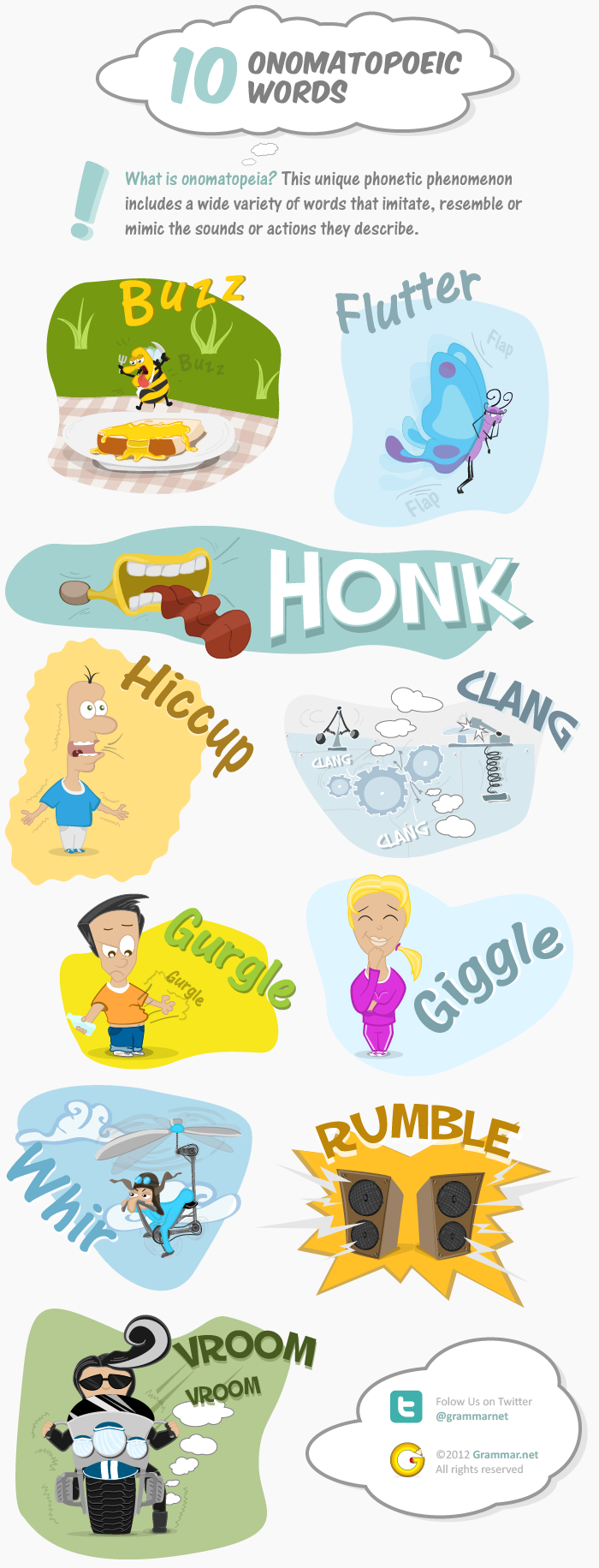What is onomatopoeia? This unique phonetic phenomenon includes a wide variety of words that imitate, resemble or mimic the sounds or actions they describe. Children use them, animal noises embody them, comic books print them and world-class poets control them. Here are 10 of the funniest, quirkiest and handiest onomatopoeic words.
To download high-resolution poster click here [2]
Embed this image to your site:
1.) Buzz
There is something undeniably thrilling and phonetically exciting about the tongue-tingling Z sound. This simple word perfectly embodies the vibrations of tiny bugs and insects. Here’s an example: “The big bumblebee buzzed and buzzed as it hovered over the picnic basket.”
2.) Flutter
This lovely onomatopoeic word captures a striking, intangible airiness and delicate swooshing with its light syllables and buoyant rhythm. For example, “The butterfly’s colorful flapping wings made the most ethereal flittering, fluttering sound.”
3.) Honk
This short word is crude, obnoxious and loud. These are traits that allow it to perfectly resemble a car horn or the call of a gaggle of geese. A person might say, “The driver wouldn’t stop honking until the car moved out of the way.”
4.) Clang
With its abrupt sound and single-syllable construction, this bold word is a highly effective onomatopoeia. For example, “The factory where Jasmine worked was filled with a cacophony of loud clangs and piercing clanks produced by the clattering machinery.”
5.) Hiccup
Like a stammer or stutter, this word perfectly mimics the uncontrollable spasm it describes. Here’s one example: “Each time Rose hiccuped, her words were interrupted by an abrupt hitch.”
6.) Giggle
Classically onomatopoeic, this delightfully silly word captures the distinctive bubbling sound of this uncontrollable form of laughter. For example, “The classroom erupted with harmonious giggles.”
7.) Gurgle
Something about the expressive combination of vowels and the hard G allows this lively word to mimic the sputtering sound of liquids. Here’s one example: “After drinking a gallon of water, Gabriella heard a terrible gurgle rise up from her stomach.”
8.) Rumble
This exciting onomatopoeic word creates a bold bass sound that mimics a strong, deep grumbling. It also evokes a tumultuous rolling sound like one might experience during an earthquake. For example, “Matthew and Anthony enjoyed every moment of the low-frequency rumble as they rode in the back seat of their grandfather’s antique car.”
9.) Whir
This popular cousin of “whiz” and “whirl” creates a strong sense of motion and power with its unique phonetic ring. Reminiscent of a bird, a plane or an industrial engine, this fantastic onomatopoeic word captures a mechanical drone and an almost indescribable sound of speed. Here’s an example: “The spinning propellers created a percussive whir as the helicopter passed over the town.”
10.) Vroom Vroom
Seemingly simple, this important onomatopoeic word is one of the most effective ways of describing the immense power of a mechanical engine accelerating. Young children are exceptionally talented at mimicking the sounds they hear, and this childlike imitation of a high-powered engine is no less masterful. Here’s an example: “Ready for a race, the drivers filled the streets with the vroom vroom of their engines when they revved their cars.”
Onomatopoeic words are versatile and evocative. These simple words are ideal for adding a dash of spice and phonetic sizzle to poetry and prose. Have you used onomatopoeic words recently? Do you have a favorite? Share your comments, and let us know.
